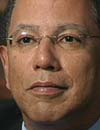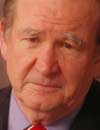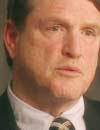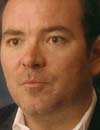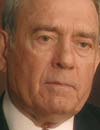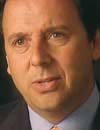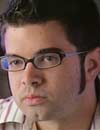- Ken Auletta
Writer, The New Yorker - Dean Baquet
Former editor, Los Angeles Times - Patrick Buchanan
Commentator; former adviser to President Nixon - Walter Cronkite
Former anchor, CBS Evening News - Len Downie
Editor, The Washington Post - Jeff Fager
Executive producer, 60 Minutes - John Hinderaker
Blogger, Power Line - Nicholas Kristof
Columnist, The New York Times - Josh Marshall
Blogger, Talking Points Memo - Mark McKinnon
Former media adviser to President Bush - Dan Rather
Former anchor, CBS Evening News - Tom Rosenstiel
Director, Project for Excellence in Journalism - Bill Sammon
Reporter, The Washington Examiner - Ron Suskind
Author, The One Percent Doctrine - Josh Wolf
Blogger, The Revolution Will Be Televised
... Pat Buchanan said in 1969 that you could cut the liberal bias in the press with a knife. Was that true? Is that still true today?
Listen, I think the press has to be honest and be more introspective about itself and its [bias]. Every survey of the Washington media shows that when they do these secret surveys of reporters, often more of them identify with the Democratic Party and with moderate to liberal policies, not left liberal -- they're not that; they're kind of establishment. ... The job of a press critic is to try and reveal that if it's there, so the public has transparency. They can see the biases.
But my own attitude is that the operative bias to worry about in the press is not a liberal bias, or even a conservative bias, though those exist. The operative bias you've got to worry about is the bias for conflict, and I think that oftentimes does cause us to have mindless coverage of events and to focus on the wrong thing, not on policy but on who's involved in a spat with each other. That gives a nice headline. And maybe our editors and bosses who worried about circulation and ratings like that more. But it isn't necessarily the function we're supposed to perform. ...
... And what have the media done maybe to help foster that impression or damage themselves?
Oh, let us count the ways. The media damages itself in many, many ways. One, you start with the blatant mistakes that are out there, be it Jack Kelley, USA Today, who makes up stories, or the fellow [Jayson Blair] at The New York Times who makes up stories and is thrown out for that; be it the television reports that are exaggerated; be it the pictures in Time magazine that are composite on the cover. So we're constantly making mistakes and giving ammunition to our critics. ...
On the other hand, we do a lot of good things and have for many, many years. There was a period of time when [Bob] Woodward and [Carl] Bernstein were reporting Watergate in '72, '73 and early '74, where the charge was The Washington Post is biased, and people like Pat Buchanan and Bill Safire to a lesser extent were out there railing against the press, against the anti-Nixon bias. Well, in retrospect, they were right. They did a pretty good job. So the press has a mixed record like every institution has a mixed record. And we do better if we admit our mistakes. That's why it's a healthy thing to see ombudsmen or public editors or correction boxes, or to see press critics online, who hold us to account. ...
... What effect on the bias debate do you think that the Dan Rather/National Guard reporting debacle had?
Well, that's a classic. What happened with 60 Minutes [II] and Dan Rather in the fall of the presidential election, if you go back and look, you say, well, 60 Minutes actually had some good scoops in there. ... They had some evidence presented that Bush shirked his duties when he was in the National Guard and didn't really fulfill his functions and get away with it because he was politically well-connected.
But then they went the next step and said they had a document that proved all of these things and more. And that document -- in part because of the power, the speed of the Internet -- within hours, bloggers were up on the air over the Internet saying, "Hey, wait a second," or, "This can't be true; this IBM typewriter didn't exist at the time they said this report was issued, and it was typed on this IBM typewriter."
So the bloggers quickly got in, and then the Bush administration jumped in; a lot of people jumped in. But CBS, for 10 days, didn't acknowledge it may have made an error. It was full speed ahead; we stand by our report. They were not being transparent, not being humble, which is what we're supposed to be as journalists. We should never be sure of anything. ...
Ten days later, they had to admit that they may have made a mistake and they were launching their own internal investigation, reinforcing a view -- not just among conservatives, but certainly among conservatives, but also among others -- that the press doesn't always get it right, often gets it wrong, and when it does get it wrong, doesn't admit quickly that they got it wrong. That was very harmful to CBS. ...
... I started out as a newspaper reporter at 19. I've spent so much time subjugating my political beliefs. ... The main political institution that I believe in is the newspapers. I've never had a public discussion about my politics.
... If you ask me to make a list of the senior editors of the L.A. Times and whether they're Democrats or Republicans -- these are people I spend all day with -- I don't think I could tell you for most of them. I'd have to guess. ... I can tell you that some of them are conservative, sure. Absolutely.
Newspapers in big cities probably have more of a feel for big-city issues, and maybe the editors and the writers are less religious, because that's the way people are in big cities, having lived in big cities and smaller cities.
But the reality [is], the newspapers I've worked for are not liberal in their coverage. There's such a system in place to keep politics from seeping into the pages of papers.
Do we make mistakes? Sure we do. There are a lot of liberals who would say newspapers were too soft on the Bush administration during the buildup to war, and there are a lot of conservatives who now would say that we're too tough on the administration for the conduct of the war. I'm not sure how that translates into being biased one way or the other. I think extremes on both sides of the American political spectrum don't like a lot about newspapers, but that's natural if you're supposed to cover the world with some objectivity.
[Imagine] I'm a conservative sitting out here, and I'm saying: "Give me a break. Didn't you, Dean Baquet, and [New York Times executive editor Bill Keller] write an editorial together?"
It was an editorial not about a political issue; it was about a journalistic issue. It was in support of the one thing that we're openly biased about, which is the First Amendment and the importance of newspapers and publishing the things we find out.
How did you meet Richard Nixon?
I met Richard Nixon [in] 1954 [for the] first time when I was a caddie at Burning Tree Country Club. I was in his twosome carrying a golf bag around late one afternoon.
But I met him in St. Louis in '65, which would be about 10, 11 years later. ... I had been three and a half years an editorial writer, and I was having some difficulty with my publisher. I went over and met him, and introduced myself in the kitchen to him, and I told him if he were going to run in '68, I'd like to get aboard earlier. ...
I got a call from Nixon's office -- invited me to come up and see him in New York, sent a plane ticket. I went up and was interviewed for three hours straight by Nixon. At the end of it, he said, "I'd like to hire you." I said, "You'd better call my publisher, because he doesn't know I'm here." So that's how I got aboard.
So you're from a newspaper background?
I was Columbia School of Journalism 1962, and I did three and a half years as an editorial writer in St. Louis. I had started, obviously, doing obits, but then, because I had an economic writing fellowship, they moved me to the business desk for about six weeks, and there was an opening on the editorial page. So I was very fortunate. ...
In November '69, Nixon delivered a speech about the "silent majority." What was happening in the country that made you write those lines and give those words to the president? What were you responding to?
I think those are Nixon's. You've got to give Nixon credit for his own lines, the great "silent majority" and the rest of it. But I'd recommended the speech because there were about 300,000 [anti-war] demonstrators in October and another 500,000 expected, who did arrive in mid-November. ...
I sent Nixon a memo saying that it was really time he was going to have to stand up and go to the country and use the bully pulpit of the presidency if he wanted to maintain a coalition behind his policies on Vietnam. And he did that, and his speech was a startling success.
But when it was over, the instant analysis from the networks and [former U.S. diplomat and Democratic adviser] Averell Harriman, they all jumped on the speech, cut it up, and the commentary was all negative. So Nixon told us to respond and write letters to the editor.
I sent him a memo through [Nixon Chief of Staff H.R.] Haldeman saying: "This isn't going to do it now. We ought to go directly after the networks themselves, take them on in public, in a high forum. The vice president [Spiro Agnew] ought to do the speech, and I will write it." I got back a little note at the top of that memo, which I still have, which said: "P has seen. Go ahead." That was the president.
So I went ahead with the draft, and I sent it over to the president. He invited me over to the office, and he started editing it himself. I was a little concerned, because the language flowed, and you don't like anyone fooling with your work. But at one point in the draft -- he had his glasses on as he was editing, and he took his glasses off, and he said, "This will tear the scab off those bastards."
Now, who are "those bastards"?
I think it is the columnists and commentators who were carving him up and denying him the right to fulfill the commitment he had made to the American people to gain peace with honor in Vietnam.
You called them an "elite," an "unelected elite."
Uh-huh. Small unelected elite.
Who do you mean? Who is this elite?
It would be the small group of editors, commentators, columnists, but with regard to the network, it is the anchors and the dozen or so people behind them who select what went on the evening news, which was the primary source of information then for two-thirds of the American people. So what we did in those two speeches I drafted for Agnew -- the second was about The New York Times and Washington Post, but the first on Nov. 13 in Des Moines was a direct assault on the networks and their denial to the president of the United States of his capacity to communicate directly with the American people and win them over to his policies. As we said at the time, there was a very small group of people who were deciding what two-thirds of the American people saw as news.
And Agnew asked, "Is it not proper to ask, what are their biases? What are their prejudices? What do they bring to the table as they choose and select what the American people will see as news?" ...
It was a tremendous success, and in response to the speech, something like 50,000 telegrams of support for Agnew went directly to the networks. If you look at the Time and Newsweek and I think U.S.News [and World Report], the cover of the magazines that next week had all of the anchors on. We had elevated the issue of network power and network bias for the first time in American history, and it was a startling success. ...
[The networks] would come back and say they put the speech on the air.
(Laughs.) I think it was one of the worst mistakes they ever made. Listen, it would not have had the impact had it not gone on all three networks. It would not have had the impact. If you hadn't had that enormous audience that they had, their captive audience, they delivered to them these addresses that basically took them apart. And the audience which had listened to them agreed with us.
In the speech, Agnew says that the people have a right to make up their own minds without having a president's words and thoughts characterized through the prejudices of hostile critics before they can even be digested.
Exactly.
This sounds a lot like what President Bush is saying today.
I wouldn't really get too much into what Bush is saying, because there's such multiplicity of sources today. Networks don't have the power they did. I mean, you've got Fox; you've got MSNBC, CNN, C-SPAN, the three networks. Sometimes the networks don't cover his speeches.
But what we were talking about then, what Agnew was talking about, was instant analysis. In other words, the president would finish speaking, and they would start chopping it up rather than let the American people make [up] their own mind about what it was he had said to them. ...
Let me give you a Bush line: "I'm mindful of the filter through which some news travels, and sometimes you just have to go over the heads of the filter and speak directly to the people." That's really your line.
He sounds like Pat Buchanan 35 years ago. Uh-huh, you do; there's no question about it. Look, a president's got an obligation to communicate with the American people. ...
That's why when you say "go over the heads of them," we would go over the heads of national television, Nixon would. In the Reagan era, we would bring in the anchors from local [media], what we called "regional media," from, say, the Midwest, and bring in all the anchors into lunch with Reagan, and we would have briefings for them. Then Reagan would speak to them and he'd take questions at lunch, and the national press would be outside of it. In that way, all of these individuals would take back segments to their local districts.
That's the whole war -- the battle between the White House and the national media is the battle over who controls the national agenda. ... The real power of the left was in the national media. ...
So this is an ideological battle?
It was a political and philosophical battle. ...
You found an issue to mobilize people around -- the disaffected, the silent majority. This was all part of a political strategy.
No, the attacks on the media were not part of a preconceived strategy. ... We didn't come into the White House saying, "I'll tell you what: This fall, let's launch some attacks on the national networks." We had an agenda we wanted to implement, and the principal impediment to that objective in Vietnam was the mass demonstrations, given aid and comfort and support by the liberal media which was attacking the president constantly. At the same time, when he would speak to the country, as soon as he would finish, they would reinterpret everything for the listener so that he would not go away carrying with him what the president had told him.
They were standing on our windpipe, and that's why we went after them. ...
So you didn't really know what the reaction was going to be to Agnew's speech. But you discovered that it was an issue, something people could rally around.
After the Agnew speech, there was a national explosion over the issue. On the covers of Time and Newsweek they had the network anchors. It was the number one story all week long. It was the hottest story in the country. And the fact is, the vast majority of the American people agreed 100 percent with us. The networks were inundated with telegrams denouncing their bias.
So what had happened was, the cordite was all out there; we just ignited it. And there's no doubt that the public responded because the public already believed what Spiro Agnew had said. ...
I really want to get back to this idea of an elite. "That elite," you've written, "is using that media monopoly to discredit those with whom it disagrees and to advance its own ideological objectives." Who is this elite, and what are their objectives?
By the time we'd come to office, their objective[s] were two: It was to break Nixon's policy on Vietnam; and in Watergate, it was to break Nixon and bring him down. We succeeded in Vietnam in winning the battle with the media. In Watergate we failed. Because of Nixon's mistakes, then they brought him down. ...
So this is the bias that you're referring to in the Agnew speeches?
Look, the liberal bias, you could cut it with a knife. Back in the 1960s, it was hard to find a conservative in the national media. ... In 1972, they took a survey of who you voted for of the national press: Eighty-five to 95 percent went for [Sen. George] McGovern when Nixon was winning the biggest landslide in American history. I mean, what was that? (Laughs.)
Well, maybe they would say, "We knew more about him as president, what he was doing."
Could be. Sure.
And that this media monopoly that you talk about, ideological monopoly, really hadn't communicated to the American public.
Why did they all vote for Mondale, too?
So you're just saying that's the way it is.
Sure. Look, if you go to the White House Correspondents' Dinner, with the exception of the Fox News table, you're not going to find a lot of conservatives there. And that's a very large group.
So it's continued to this day?
It continues to this day. But with regard to the establishment media, it is the citadel of American liberalism. It's what's left. That's where the real power is, and it continues to this day.
But if they don't win elections, they don't own the media?
Well, let me say this: If the media turned against the Democratic candidate, he would never have a chance. We conservatives can beat them at times, and at other times we can't. But if the media ever abandoned the liberal wing of the Democratic Party, I don't think it's got much base in the country.
The Democratic Party?
The liberal wing of the party doesn't have much base in the country.
So if things reverse -- because in my memory, most newspapers and media before television were dominated by Republicans, by conservatives mostly. They never endorsed Franklin Roosevelt.
Let's come up the to modern era, when I was raised. Let's go down: The Boston Globe, Hartford Courant, The New York Times, Philadelphia Inquirer, Washington Post, Atlanta Journal and Constitution [sic], even the Chicago Tribune, L.A. Times, Denver Post -- not a single conservative paper there, not one. All the big ones, the major newspapers, the networks, the White House press corps -- overwhelmingly liberal, left of center. I don't think they'll deny it. They don't deny it anymore. Probably wouldn't do them any good, because I think we persuaded the country, or the country was persuaded. What Agnew did was tell them what they already knew in their hearts. That's why they got the response we did. ...
Walter Cronkite has written that ... stories on the front page of the country were almost without exception exactly what it was on the networks' evening newscast. And the editors of those mostly Republican-owned newspapers then weighed the news and came to the same conclusions as the broadcast editors did.
That's Mr. Cronkite's view. But the point is, when Vice President Agnew spoke to the country -- and it was the first time he had ever spoken on national television -- the response was extraordinary. ...
That tells me that the American people had come to their own conclusions, and all Agnew did was articulate what they saw and what they believed. Cronkite had an opportunity every night after that to challenge that, as did his successors.
What has happened is that we have won this battle. We have won this war to the point where the American people, when they look at the network news and someone says, "That's the way it is," they say, "No, that's not the way it is; that's the way [Dan] Rather or Cronkite or some of these other fellows think it is, or believe it is, or want us to believe it is."
What the networks had done was to try to create a sense of skepticism and disbelief about Nixon and what we were saying. What we said is, "Have that same skepticism and disbelief when you watch the network news." And they did, and they do now.
And so Nixon got a landslide in '72.
Nixon got a landslide in '72 despite all that support from the media for McGovern. Nixon was in touch with middle America in 1972. ...
When I came to the White House -- I won't mention his name -- there's a columnist [who] later on came to see me in the White House, and he said: "What you've got to understand is that we are the adversary press. In other words, we are your adversaries."
I said to him: ... "Why? We'd been elected. Nixon's been elected to carry out a certain agenda on Vietnam and domestically. Why should the press be our adversary?" And he said: "Well, that's our function now. We're the adversary press."
If someone decides they're going to be our adversaries, it seems to me within our rights to deal with them as an adversary. I think that [was an] idea which Nixon already had and a lot of us did not when we first went to work for Nixon. Nixon had more journalists working for him than any president before him. We didn't have that attitude, but I think by the time Nixon left office, virtually all of us did. …
William Safire wrote in one of his books there was a "conspiracy on the part of the Nixon administration to discredit and malign the press that was encouraged, directed and urged on by the president himself."
That's inexact. But there's no doubt. Look, when I came with Richard Nixon, he told me, "The press is the enemy." I did not believe it, or I argued, "Look, there's a number of people that don't like you, but there's a new generation that's come along since 1966. It's not 1948," in his case.
But there's no doubt that as we became engaged and in battle and the press became the main adversary -- we did see them as our adversaries, our principal adversaries -- we did go after them and fight back. We did launch pre-emptive strikes. The whole idea, however, was to enable the president [to have the] freedom of action to put into place what he was elected to do. If all things were equal, we didn't want the war with the press. Why would we want it?
You want them to surrender. You want them to be on your side.
We wanted them to get off our back, and if they couldn't get off our back, the thing to do was to throw them off your back. And that's what we did. If they're going to challenge our credibility, then we would challenge their credibility. We had every right to do so.
Frankly, they did not break us as they broke Johnson. What broke us was, quite frankly, the mistakes Nixon made in Watergate. And of course they were exploited by our enemies and adversaries to bring him down. ...
Today, reporters are being subpoenaed about information that they get from individuals in confidence, and they may not even have written anything about it.
Well, it's the [New York Times reporter] Judith Miller case. Look, if the press was screaming and hollering and demanding that the special prosecutor be appointed to find out the leak and that [then-Attorney General] Mr. [John] Ashcroft recuse himself, and so they get him a special prosecutor [Patrick Fitzgerald], and he said, "Oh, OK, I'm going to find the leak," and he goes and asks the same journalist, who knows who leaked, and they don't talk to him.
Basically, I've got to agree with Fitzgerald on this one and the judge ... that approved the subpoenas and imposed them on Judith Miller. I think she should have had to testify.
You don't think journalists have a right to protect their sources?
I think they have an obligation to protect their sources, a duty to do so, but I do think that the journalists really do not have special rights that do not attach themselves to other citizens, no.
So then how can you protect your sources?
I think you just do your best to protect them. I don't understand this. If I were a White House aide, for example, and I'd been told something in secret -- as I was. I was hauled before the grand jury; I had to talk about my conversations with the president of the United States.
You mean if I talked to a journalist, he doesn't have to tell about his conversation with me, but I have to talk about my conversation with him? ... When I leave the White House as a sworn assistant to the president and become a columnist, why do I suddenly get new rights?
Why do you think there's a First Amendment clause in the Constitution in the Bill of Rights?
So that the press is free to report and comment on what it wants.
How can it do that? How can it gather information, particularly about government, without some protection to the people who are willing to talk to you?
It looks like it's been going just fine. (Laughs.) I haven't noticed any chilling effect in this town on people talking to reporters because of the Judith Miller episode.
Or the pending leak investigations that are going on.
No. It's going to start happening again.
Let me go back to the bias issue. When you think about those days and you think of today, can you compare it?
I can. Here's what's happening: Since the Agnew speeches, there has been a tremendous -- I don't deny it -- a corrective. The first thing that happened was the arrival of young conservative columnists on the op-ed pages of various newspapers to the point where they almost dominated the op-ed pages.
Then came the arrival of talk radio in the '80s. You had the arrival of nationalized talk radio with Rush [Limbaugh], and you've got the Internet, and you've got Fox News. So, if you will, there is an alternative media today. It's a populist media. Populist media today is conservative. ...
So from your point of view, things are much better?
There's no question about it. I can see talk radio is a tremendously powerful influence, and it's overwhelmingly dominated by conservatives. ... These are reforms.
These are reforms?
Uh-huh. Excellent reforms, partly as a consequence, I think, of the criticisms of the media. Some of the media made the reforms themselves about the op-ed pages and partly as a result of a marketplace. The American people want to hear conservative voices, and with this multiplicity of cable channels and news stations -- all-news talk … and syndicated and networked radio -- people pick and choose what they want to hear.
They want to hear Rush, and they want to hear [Fox News' Sean] Hannity, and they want to hear the conservative voices, and the liberals have a very hard time. You've got to go to taxpayer-subsidized PBS pretty much to hear a lot of them.
So you think PBS is biased?
If the institution is tax-exempt or tax-subsidized, you'll find liberals are much stronger in it than conservatives. If it's [a] monopoly, if it's more free market-oriented and there are tremendous multiplicity channels, you'll find conservatives do just fine.
And how do you explain that?
I think the people are conservative. ... There are people who are interested in news, ideas, information -- they're conservative. And when you give them a place to go, they will go to it. If you build it, they will come.
So you don't believe in the idea -- and I'm thinking H.L. Mencken and others -- that journalists have a role that is outside of just meeting what the popular demand is, what the popular thinking is?
I'm talking about conservative commentators. But sure they do. I think [there] is an honorable role in journalism for objective, straight newsreporting.
What? Objective, straight news reporting? Where do you get that?
... My argument about the media is, look, be one or the other. I've always been a commentator, a columnist and opinion writer. I'm not a straight newsreporter. But these other fellows that move from one to another to another -- one day you see them on the editorial page; the next day, they're on the front page with the lead news story. That's always bothered me more than the people who were up front and had their cards on the table.
Are you saying that the correspondents and reporters on Fox News are objective news reporters?
I'm sure some of them are. I think they are objective. Yeah, they're objective news reporters. But there's no doubt that many of them are looking for stories that interest a conservative audience. Washington Times is a conservative paper; Washington Post is a liberal paper. I read them both every day.
I know, but you made reference to an objective news reporter. We're looking for an objective news reporter. Given your experience, where is he?
The animal still exists. I think you find a number, for example, covering the war. Sure, there's a lot of objective coverage there, sure.
In The New York Times?
Sure. I think John Burns is an outstanding reporter, does a great job.
So not everybody in the establishment media is a biased reporter, slanted news.
... Let me give you an example. [New York Times reporter] James Bennet is going to [become editor of The Atlantic] magazine. He covered my campaign, and when he first showed up in Louisiana, I looked at him. I said, "This fellow looks like Lenin." (Laughs.) He had a beard and [was] this bald-headed young guy. But his coverage of my campaign was as objective and fair and exhaustive -- he made every effort to understand all my ideas about economics and trade. And he did a piece in The New York Times -- it was one of the best pieces I've ever seen in terms of condensing and explaining and presenting clearly, comprehensibly and I think persuasively exactly what I believed. ...
You wrote that the Bush administration "could not have taken us to war without the complicity of the press." You said: "And what of the punditocracy which led us into war? Did they serve their country? Or did they serve as the king and his courtiers by reciting such fairy tales as Mohamed Atta's secret meeting in Prague with his Iraqi controllers?" What did you mean by this?
If you read Bill Safire, you'll see that he was talking about this secret meeting in Prague and what had happened. I think that a lot of the magazines -- I would say The Weekly Standard, a lot of the neoconservative journalists and magazines put out what I believe is pure propaganda. They didn't make an effort to check it out if it advanced the cause of the war. They wanted it there.
War is good for business. It's exciting. It's the most exciting thing journalists can do. I think a lot of them wanted the war, and I think the media fell down on its job. …
That's why we launched our magazine, The American Conservative. The whole purpose was to say there are conservatives who don't want war and that this war is unnecessary and, in my judgment, unjust, and it's a war of choice, and that we shouldn't go to war. And we did every single issue. We dealt with that question. Frankly, I think we did an outstanding job, and we were proved right. But I will say we were in a clear minority. ...
You sound like the liberal media of the late '60s questioning the war in Vietnam and the president of the United States and his motives.
The difference was we had a magazine with 10,000 circulation. I didn't control all three networks. ...
What do you think about The New York Times reporting a secret program of eavesdropping by the National Security Agency [NSA]?
The New York Times held that story for a year as I understand it, so clearly they had concerns and qualms about whether they would damage the national security by publishing that. I would not have published that in wartime if I were the editor of The New York Times.
While I oppose the war, I don't think you do something like that which would, I think, damage the war effort and the cause for which people are dying. That's a tough call, but I would not have done what the Times did. And I do think the individual that leaked it to the Times, they should be prosecuted and sent to prison.
The Washington Post has published, among other things, the fact that countries in Eastern Europe maintain secret detention facilities for the United States to deposit so-called high-value detainees or others apparently linked to terrorism.
They've damaged, in no doubt, the countries that are probably assisting the United States of America. You've damaged them at home because they've worked in alliance with us.
What bothers me about this is a number of these newspapers cheer us into war, and then Americans go into battle, and they get killed in great numbers. And then these folks tend to undermine the war effort.
It was my objection in the Pentagon Papers. They had nothing to do with Nixon. That, to me, was a clear effort to sabotage the war effort in Vietnam, which both The New York Times and Washington Post had supported. We had asked for time to review them so that we could see that no sources and methods had been compromised. It had nothing to do with Nixon. And they wouldn't give us that time even though they held those papers for three months so that they could present them in such a way as to make them do maximum damage to the war effort. I thought that was quasi-treasonist in wartime, yeah.
You don't think the press has an obligation to act as a tribune, if you will, of the people?
Do you think the press should report that some soldier took a Koran and flushed it down a toilet when he knows the results could be riots and demonstrations in which people get killed? I think the press has a duty and an obligation to consider the consequences of what they report when they report it, especially when lives are at stake.
Yeah, but you don't know, as a reporter or a columnist, what the actual reaction is to many of the things you may say -- especially you, as a columnist -- that are, if you will, designed to get people to take notice.
I don't think you reporters can fall back on the "I didn't know what the reaction would be" in every case. I think they should consider the reaction. Certainly they do when they have information about the private lives of public men.
Journalists say: "Look, should I really report this? People really have a right to know? This could damage or destroy this guy. Is it really relevant?" They'd make all those judgments. And I think they ought to make a judgment, especially when we're at war, as to what will be the effect if I publish this? Certainly The New York Times did that when they waited for a full year to publish this story which they had and they held.
And they removed elements of the story ... related to sources and methods.
Well, you're making my point, which is that they had themselves to reflect and consider and ask government to "Please help us so that we will not do damage, or any damage that's done will be minimized." So I think that's a sense of responsibility, but, as I say, I think if I were at the Times, I would not have reported that. ...
You called the conservative media, radio, Fox, etc., "alternative." Fox is the biggest thing on cable television. It's the establishment. And these conservatives you keep talking about, they're all connected to their own establishment.
There's no question that Fox is the biggest thing on cable TV, but they're still not as big as NBC, CBS and ABC. They're not as big as The New York Times and The Washington Post. ...
So they're their own establishment? There's no longer a minority.
It's a counterestablishment. I hope you don't think we're the national establishment. (Laughs.) ...
[And you say] these liberal bastions -- The New York Times, The Washington Post -- aren't always liberal. They sometimes actually do objective, good reporting.
Well, let me tell you what the proper metaphor is: These are basically vessels that fly neutral flags, but they're hauling contraband, and at night they can change the flag and become something else.
That is what the newspapers of America are. The Washington Post is a great newspaper. It is also a great fighting organ of American liberalism. It is also an attack instrument of the Democratic Party and liberalism in a campaign. And it also has exhaustive, interesting coverage, good sports coverage, all manner of things in there. ... The New York Times is not just one thing; it is many things. But one of those things is, it's a fighting arm of American liberalism as well as a newspaper. ...
... Pat Buchanan would say that back in those days, when there were three networks and you dominated the news, you were in a sense a monopoly. And for people getting information, ... the problem, from his point of view, was your bias, -- that you're a liberal. ... Are you biased?
I'm a liberal, but I'm not biased. Seriously. ... A journalist covering politics, most of us are aware of the necessity to try to be sure we're unbiased in our reporting. That's one of the fundamentals of good journalism. We all have our likes and our dislikes. But ... when we're doing news -- when we're doing the front-page news, not the back page, not the op-ed pages, but when we're doing the daily news, covering politics -- it is our duty to be sure that we do not permit our prejudices to show. That is simply basic journalism.
You felt it necessary apparently back then in 1969, ... after Agnew's speeches, to publicly reply. Apparently you went to St. Joseph, Mo. That's where you were born, St. Joe?
Yup, yup.
Why did you do that? Do you remember?
Yes. I had decided at that time that it was time for us not to answer on air, but to demonstrate nearly as we could and to explain as nearly as we could how journalism works, how we work in a given environment: a political convention, election. That is not the way [Sen. Barry] Goldwater [R-Ariz.] thought it was done and preferred to have the people believe it is done. ... I thought we should try to educate the public as much as we could as to Agnew's attacks upon us.
There's no reason why we should remain silent when we are under such attack. We can't use our own reporting to do it. ... I did not feel we could do it on our own program. We later on got to the point where we were doing some pieces in retort, but that was ... at [a] later stage. ...
We may have our own prejudices, but we are not permitted to use them in a news broadcast. We might do it in an editorial piece somewhere, if you have that privilege. ... But most of us didn't have that opportunity. Those of us doing news broadcast did not have our own little editorial niches. ...
When you see what happened back then with Nixon and that confrontation with the press, and you see what's happening today with the Bush administration and the press and the way in which the press is characterized, ... what do you think?
I think that there has been little change there. I think, however, in the present situation, that White House is so buttoned up, so lacking in associating with the press really, that the press itself, ... [the print press] who cover the White House, are embittered by the fact they're kept so distant from the people of authority, that they aren't answering back. ...
Let me take you back again to the Nixon era. In those days, like when you were covering Watergate, apparently you would get phone calls from the White House, complaining about your coverage. And [President Lyndon] Johnson had complained.
Johnson complained. He was on the phone before I was off the broadcast insisting that they put the telephone line through to [me]. Our poor secretaries in the news area. We'd get these calls from the White House, and he'd say, "I want to talk to Cronkite," and they'd say, "Well, he's on the air." He'd say, "I know he's on the air, but put him on the air with me." They had a hard time keeping him off the air for a few more minutes until we were off the air. Then I would take his calls, of course, and he would complain about something we had on that day.
And I understood you got calls from [Chief Counsel to President Nixon] Charles Colson and other people in the Nixon White House.
Oh, yeah, those as well. However, they more frequently called the heads of our network, ... and not the news department.
Did [the network head] protect you?
I wouldn't say protected us. He would get back to us and say, "They didn't like something," but he never said, "Don't ever do that again." ... He just relayed their complaints. ...
So it sounds to me that as Lyndon Johnson was calling you directly, the White House was calling you under Nixon, ... their criticism was that they couldn't get their message without alteration, without interpretation, to the American people, because you and your colleagues ... would comment on speeches or, in a sense, be a filter between them and the American people.
Well, of course that was a highly limited situation. The number of editorials that we had on the air were minimal: ... one editorial a week. Now, those are labeled as editorial. Those are labeled as a personal opinion ... each time they're put on the air. That certainly did have an advantage, being on the air, over the fellows not on the air, the politician. But there wasn't much of that around. ...
The politician making speeches, if he's being covered -- now, of course, if we chose not to cover his speeches, then he was handicapped, I suppose. Certainly there were a lot of speeches made in the whole house of Congress they would like to have had covered, like to have repeated them on the air in some broadcast. They weren't given the chance to do that every time they made a speech. But when they made important speeches they were on the air. ...
Now, we made the judgment as to whether they were important speeches or not. They couldn't call us up on the phone and say, "I'm making an important speech; I want to go on the air." We'd have to find out what that important speech was before we cleared airtime for them.
Right. But you know what they were complaining about. They were complaining as President Johnson was complaining when you did that special about the Tet offensive, and you did an editorial at the end of it. ... Later on Bill Moyers wrote that the president said, "If I've lost Cronkite, I've lost middle America."
Yeah.
You had a certain kind of power that they felt threatened their elected power.
... If one of our editorials really had had that much power, why, it pleased me. I wasn't timid about it. I don't think anybody else in television ... in those days ... [was] not taking advantage of them, ... the mere fact that in television [the editorial] seemed to have a greater impact to them because they could see the weight of it, as opposed to understanding the weight of a printed editorial.
What [about] their complaint, and it continues today, that establishment journalists -- and you being, if you will, the biggest establishment journalist there's been in 50 years -- that you hide your bias. You don't reveal to the audience your voting record, your political beliefs, and you operate as if you're the voice of God.
Yes, I've heard that -- the voice of God. I do feel I speak from on high. When I'm CBS News, it's about as high as you can get. I understand the displeasure on their side, but I don't know if there's any remedy for that. They get on the air when they have [a] serious, important address for the people that is going to make some change in our situation, ... if they've got something of real impact.
When I make that judgment of impact, that is what journalism is about. We make the judgment as to whether something is important or not. That's how things get in the newspaper. That's how things get on the evening news broadcast. What they think is important, it may not be what we judge to be important. When we judge it, we're not judging it from on high, but through the journalism standards, on what interests most of the people at any given moment in time, and that which is important to most of the people gets on the air.
Every speech they make on that same subject in Congress isn't entitled airtime. The fact that they're bringing the subject into the Congress [when] it's a new subject, or a solution to our problems, or a response to somebody else's solution to our problem when that problem is forefront in the news, they're going to get on the air. What they're unhappy about is that every time they have done a lot of work on getting a speech organized, ... they expect it [to be covered] because they have worked on it so hard. ... They feel that they're entitled to airtime. We don't have that much airtime. We can't do that. ...
As far as the "liberal press" problem goes, I've got my answer to that: ... Most of the press owners, most of the broadcast owners, are conservatives, I believe. ... Whether they're conservative Republicans or not, they're basically Republicans. If we are so prejudiced, why don't they fire us? Why don't they go out and hire what they think are conservatives, Republicans, and replace all of us newspeople? ...
What people need to understand, I think, are the principles of good journalism. And most of ... those who I've met and know and watch on the air and read in the newspapers are not writing or broadcasting with bias. They may be liberal, but that bias does not show in their copy or in their broadcast. ... We learned through journalism school, and we're constantly reminded -- from our city rooms and our offices and the studios -- we know that we must be careful not to let our personal feelings affect our newsgathering and our news presentation. I'm not talking now, of course, about the editorials in the newspapers or the commentaries on the air. I'm talking about the news broadcasts. ...
Every person we speak with who would identify themselves as a conservative journalist says: "Bias? If you think we're biased, look at The Washington Post, that liberal newspaper."
All I can say is that people just need to read us and then decide whether we're liberal or not. We're an independent newspaper. We have a strict separation, between the editorial page -- which, last I heard, is a supporter, for instance, of the Iraq war and considered by many liberals to be rather conservative -- and our news gathering.
In our news gathering, we seek to be strictly nonpartisan and nonideological. We're human beings, we make mistakes, but we do not set out to be, nor do I think we are, liberal. And judging from my e-mail traffic in recent years, the left is much more critical, and much more angrily critical, of our coverage than the right has been.
The Pew Foundation did a study, and it said 48 percent of the people that they polled said that the people who decide what's in the news are out of touch with reality, with their reality. So how do you see yourself as being a representative of the public's right to know?
We are the access point for the public's right to know; we enable them to get the information that people ought to have. I'm clearly not a representative of the general public myself, although I'm not an Ivy Leaguer. I grew up in Cleveland, Ohio. I went to a state university in Ohio. I've never been part of the Eastern liberal establishment. And I don't vote; I stopped voting in 1984 because I wanted to be completely nonpartisan and nonideological as the final gatekeeper of what goes in The Washington Post. ...
We have very strict rules at the newspaper where members of our staff are not allowed to be in politics of any kind except to vote: They can't contribute money to candidates; they can't belong to any organizations that lobby Congress; they can't participate in demonstrations; they can't sign petitions.
Because you think your reporters and you are objective?
No. "Objective" is not a good term, because nobody's objective. We're all human beings. If I said that the tie that you're wearing right now was maroon, you might say it's dark red, and we could both be correct; there's no objective way of describing the color of your tie.
Instead, there's a fair way of describing your tie: I cannot say that your tie is full of spots, it is dirty and should have been laundered a long time ago, because that wouldn't be fair. That wouldn't be accurate, and it wouldn't be fair. So we try to be accurate and fair as best we can every day. And we make mistakes, and we correct them the next day.
So if someone says that you are a biased organization, or liberal?
No. ... Unbiased and objective are two different things. "Biased" means I would go into editing a story wanting it to come out pro-Democrat or pro-Republican, liberal or conservative, whereas "objective" would mean that I have absolutely an empty mind while editing stories, and that's not true.
But research polls that are done with readers, with your audience, say that they do perceive bias in elections, in whom you support.
Sure. Well, readers bring bias to their reading of the newspaper and to their watching of the television. The very same article in The Washington Post can draw very strong negative e-mails these days from both the left and the right, because the right want it to come out from their viewpoint; the left want it to come out from their viewpoint. ...
I'm trying to put myself in the seat of [Counselor to the President] Dan Bartlett and the White House: "Here comes 60 Minutes, and they do Abu Ghraib to us. And then they try to do a pre-election story [with] apparently phony documents. And you're not biased?"
I'm not going to try to defend the document story. ... I will defend Abu Ghraib forever. Of course we're not biased. You're doing reporting, important reporting about the war that ended up being -- the American public had to know that. The Pentagon, the Department of Defense cooperated with us in the end on that, gave us an interview with the general [Brig. Gen. Mark Kimmitt] who really sealed that piece, and we aired it with their cooperation eventually.
So we're doing our job there, and it's not an easy job to do. Nobody wanted to report what was going on in Abu Ghraib. We were the first to report it, and it was a tough thing to do, and it took an awful lot of time to vet it. We worked that story forever in terms of fairness and making sure that those pictures were accurate. ...
I don't buy the theory that reporters aren't against Republicans or against President Bush; they're just anti-authority, or it's just their job to be adversarial. That has not been my observation in many years of watching the news.
There are certain groups that they're almost never adversarial to. How often do you see mainstream reporters exerting any critical or taking any critical look at all at the environmental movement, for example, or at feminism? Those kinds of things get a complete pass. They talk about afflicting the comfortable. Well, the most comfortable people in our society are liberals who are environmentalists and feminists. And believe me, they are not be afflicted by the press. ...
Where's the adversarial role, for example, toward the judicial branch of government when the United States Supreme Court comes out with a liberal decision? Which hasn't happened so much lately, but over the years, it's happened a lot.
Where was the check and balance? Where were the newspaper stories questioning that decision, pointing out its weak points, pointing out the other side, speaking truth to power, afflicting the comfortable Supreme Court justices? It didn't happen. Journalists like to talk about being adversarial, but the truth is, ... [who] they're mainly adversarial toward is Republican politicians.
If you look at a press conference today with President Bush, it's shocking. It's disgusting to see how some of these reporters put themselves in the position of being representatives of the Democratic National Committee, in effect, being hostile to the president in such a way that he can't possibly come across positively to people who are watching that event. That didn't happen with Bill Clinton. And if we have a Democratic president starting in 2009, it's not going to happen there either.
Doesn't mean that no reporter will ever ask a tough question. Sure they will. But you will not have the kind of across-the-board hostility that you see in a Republican administration. ...
I think that press coverage of the Bush administration has had the unfortunate result of confirming every prejudice that people have about liberal bias, because there is an overlap of two distinct things that tend to get muddled together.
One is that frankly, there is to some degree within a lot of the mainstream media some genuine liberal bias. I think more reporters vote Democratic in the biggest papers than vote Republican. On the other hand, what is much more important is a sort of bias of antagonism, if you will; an effort to cover very aggressively government officials. In this case you have government officials who are conservative Republicans, and therefore, when you have that kind of tension and antagonism, then a lot of people, and particularly Republicans, see that as proof of liberal bias.
I genuinely think there is a certain amount of liberal bias. But I think that most of what is going on -- and indeed what was going on in the Dan Rather case, for example, which is Exhibit A for a lot of people -- had more to do with very aggressive coverage of the ruling establishment than with political biases.
... Yeah. Going back about a quarter of a century, you have a mainstream news media which, as many people say, is made up of people who are predominantly Democrats. However, they're working within these canons of objectivity, reporting both sides, etc. On the other side, you have the right-wing news media that is made up overwhelmingly of conservatives not following the same canons of objectivity. So you have people at The New York Times and The Washington Post that I think, for a generation, ... have been used to thinking, "All right, I'm reporting this news." And then the second thought they get in their head is: "Is reporting it this way going to get me accused of liberal media bias? How do I counter for that? What do I do to pre-empt those charges of liberal media bias?"
Basically, the right has, I think, been working the refs -- to use a basketball metaphor -- for a quarter of a century. And for people who have my political viewpoint, that leads to a dominant form of media reporting that skews to the right, even if it's written by people, produced by people, who may tend to vote as Democrats.
You're saying the conservatives have been, if you will, raising hell about the establishment media's coverage of, let's say, the White House, and it has had an effect, ... even if [editor] Len Downie tells us, at The Washington Post, it doesn't have any effect?
I'm certainly not saying he's lying. I've worked in conventional journalism, I have a lot of friends who work in conventional journalism, and I think it's not an overstatement that in many newsrooms, the train of thought goes, "What's the story?," a; then b, "How are we going to get accused of liberal media bias?" When that is your chain of thinking, you inevitably end up with, I think, a very skewed kind of coverage. ...
What I think has happened in the last three or four years, mainly because of blogs, is that there's finally noise on both sides. For reporters, I have no doubt that's not pleasant. And it's not because they're coddled or something. It's not fun at all getting your judgment second-guessed, whatever. And in some cases it's ugly; It's yelling, and it's unfair complaints and stuff like that. But I think the final result is better journalism than you've had in the past, because there is critique, active critique, from both sides. So even though it's not fun for journalists, ... the net result is a positive one. ...
What's to stop partisan journalism, like Fox News, for instance -- I think you would call that partisan journalism, right? -- from the slippery slope of becoming propaganda? I think in a lot of cases, Fox News has already slipped down that slope. They've fallen and they can't get up. It is a slippery slope.
I don't think the president thinks, nor do I think, that there's an inherent ideological bias in the press. The president has described the press as a filter, which is exactly what it is. It filters the news and presents it in a way that it determines is the best way to present the news. But we live in a different information age today, ... so the president and the White House, unlike any other White House, has opportunities to deliver news straight to viewers and straight to voters without the press filtering it. ...
But do you see the press as another interest group?
Yeah, I think the press has an interest. I think the press has an interest in communicating to its viewers or readers, and their viewers or readers drive profit for those news organizations, so I think those news organizations have a certain bias toward their own readers. Yeah, I think they are a special interest. Of course they are. …
Would you say that the so-called mainstream media is biased against President Bush?
No, not necessarily. I think it's just a bias toward conflict. I think they'd write a conflict story about Bush just as they'll write a conflict story about Kerry. I don't think that the press in 2004 was any more unfair to Bush than they were to Kerry. The same thing with the 2000: I don't think they were any more unfair to us than they were to [Vice President and Democratic presidential candidate Al] Gore. They were unfair to both of us.
So you simply just don't trust them.
I simply don't trust them. I know that they want [to] write a story that has conflict. I know that, I acknowledge it, and I proceed accordingly.
Listen, it doesn't matter if I go on CBS, PBS or Fox. Whoever is interviewing me is going to want to create some conflict in the story, or it's not interesting. That's just the way the news is. We can go out in campaigns, and we'll try and strategize: "Let's go do a press conference on our policy on the environment. Let's go to a manufacturing plant and talk about our economic plan" -- zero coverage or the back of [page] D17. We do the story attacking Kerry -- page 1. Biased for conflict.
I think the press are good people; I think they're educated people. But when they go to report, it's going be about conflict.
But you don't think that the press, especially the Washington press corps, has a bias against the president and the vice president?
The Washington press corps would have a bias against whoever is president. It doesn't matter who's there. ... I think that the Bush administration recognizes that coddling the press doesn't get you anywhere. ... And with the proliferation of news organizations now, the president can't sit down with every news organization in the world and have interviews, so they pick and choose their opportunities to get their message out in the way that they think will best communicate their message. Pretty standard operating procedure for any presidency. ...
But both have categorized you -- if not they themselves, then through their emissaries and allies -- as their nemesis, the liberal Dan Rather who's out to do them in, the biased reporter who wants to destroy their careers.
When you cover politics, you're going to get this sort of thing, and when you're on television regularly, and you see yourself as a reporter as opposed to just being a presenter, and when you're as independent-minded as I am, you're going to get this thing. ...
People such as yourself say: "Well, wouldn't it have been smarter to think of yourself as anchor rather than a reporter? Wouldn't it have been smarter not to ask tough questions of power? Wouldn't it have been smarter not to reveal truths that people in power didn't want revealed?" Pursuing Iran-Contra with President Bush the first was asking tough questions of people in power that they didn't want to answer, and they always try to change the subject. And with the second President Bush, it would have been a whole lot easier not to work on 60 Minutes II, and a whole lot easier not to put yourself on the line with stories, but I chose to do it, and I'm not sorry that I chose to do it. ...
So much of the strategy of attacking the press works because there's already a good chunk of the population that believes the press is biased. But why is that?
I think that the growing sense of unease about the press is fed by three different things. One is the press's behavior itself. The technology has exploded, and that has resulted in most news organizations having a smaller piece of the pie, smaller audience. They've cut back on their news-gathering resources as their audience has shrunk. … That's fueled the sense that the press is not operating in the public interest, but has been operating in the interest of its shareholders and maintaining profit margins and things like that. So that economic behavior has fed a dissatisfaction with the press. ...
The second reason that attacking the press has worked is that we've now had 10 years of politicians, mostly on the right, attacking the press as being biased. There's a context now. When you make that accusation, I've been hearing it for so long it must be true. There's also more information out there about the press that shows that journalists tend to be more liberal. That newsrooms in the 1990s actually did become, between the 1980s and the 1990s, more liberal.
Then the third reason that it works is that we know, in public opinion polling, that more people are inclined to think that the press is biased for the other two reasons. So you're now preaching to a more persuaded audience when you make these accusations.
Then, quite apart from whether or not it works or not in terms of public opinion, it does tend to put reporters on their heels, because reporters feel that they're trying to be fair, by and large. Often they don't succeed. But when you attack them as failing in their professional ethics of fairness, they want to redouble their efforts to prove that they're fair. …
In this mainstream media coverage, is there a liberal media bias? If so, how does the bias reveal itself?
I think the mainstream media's liberal bias usually manifests itself in ways that are somewhat unconscious. I'm a member of the White House press corps, so I work every single day with members of the mainstream media -- The Washington Post, New York Times, CBS -- and they're great people, and I love them to death. They're my friends, but they're liberals. They just are. People sometimes want to argue about this. And I'll argue about almost anything, but there's just no arguing this: The people are liberals.
Now, the problem is that sometimes, oftentimes, these people will approach a story of the day, and they will frame it according to their own liberal worldview, and they have this assumption that they're framing it according to the worldview of middle America and the sensibilities of somebody in Ohio, for example. And it really isn't. They really aren't reflecting the sensibilities of someone in Ohio. They really are reflecting -- I hate to say it -- the East Coast elite sensibilities. It's a cliché, but there's some truth in it. ...
I think that has provided an opening to the rise of the alternative press, where you've got Fox News coming in and saying: "Hey, we're actually going to provide a bunch of conservatives on TV as well as a bunch of liberals. And we're going to mix it up, and you're going to get a more fair and balanced look." Now, is it going to look relatively more conservative than what you're used to? Yeah. That's because what you're used to has basically been a one-sided discussion. So I think Fox looks relatively more conservative. But on balance -- and nobody gets it exactly 50/50 -- but on balance I would argue that Fox News is actually closer to getting it down the middle than the mainstream media, which is clearly slinging it to the left.
Can you give me a specific, recent example?
Yeah, sure. ... Seven days into the war on Afghanistan, The New York Times ran a front-page article comparing it to a Vietnam quagmire, and then within a couple of weeks after that, all of the press, all of the mainstream media, was echoing this business that it was a quagmire. ... And just as this tremendous gloom-and-doom coverage reached a crescendo about a month into the fighting, what happened? Allied forces swept across most of Afghanistan, and the press was in the embarrassing position of saying, "Oh, maybe it wasn't such a Vietnam quagmire after all."
So the press gets it wrong time and time again, and I think a lot of it is for ideological reasons. ... And they never held themselves accountable. The press is the one powerful institution in American society that is utterly unaccountable. If any other institution in society, whether it's government, business, sports, entertainment -- you name it -- had made these kinds of blunders of historic proportions, the press would be all over them, and heads would roll. ... But when the press gets it wrong, which they do all the time, they just sort of shrug, and they kind of move on to their next wrongheaded story idea. ...
Are you part of the mainstream media?
No, I am not, nor have I ever been a member of the mainstream media. I can raise my right hand and swear to that. What's funny about the mainstream media is that for reporters like me, who try to come at stories from a different angle, who try to question the conventional media groupthink, there is a lot of low-hanging fruit to be picked, because when virtually every other newspaper wants to write a story in the same way that The New York Times writes it, that leaves the field wide open for people like me. ...
Do you feel like a voice in the wilderness in the White House press corps? Are you the only non-liberal in the White House press corps?
It's interesting. Even though the White House press corps is populated overwhelmingly by liberals, there are a couple of closet conservatives in there. ...
Just recently, ... I was talking to a reporter from a very, very large, well-established newspaper in the United States, national newspaper, and this reporter was telling me that he had written a story the previous day, and his editors kept coming back at him and saying: "How is this Bush's fault? How can we make this Bush's fault?" This reporter is sort of a conservative, sort of a closet conservative, and he was telling me, he says, "Look, I'm not even that big a fan of Bush, but not everything that happens is Bush's fault, and yet my editors, I'm constantly fighting with them."
My point is that even if you have an occasional conservative that's in the closet, that's in the White House press corps, it doesn't really matter, because that conservative is reporting to liberal bosses who are looking at the world through the prism of, how is this Bush's fault? …
Should the press be patriotic?
I don't know that the press needs to be overly patriotic. Here's the problem with the press and patriotism. There were a couple of famous journalists years and years ago who were given this hypothetical scenario: If you were traveling with the enemy, and you found out that they were going to launch an ambush against U.S. forces, would you alert the U.S. forces? I'm sure you heard this. They said no. And they said, "Well, why wouldn't you do that?" And one of the reporters said, "Well, I'm a journalist first and an American second." ... I mean, that's a problem. That's a problem. ... And again, that's why conservatives regard them, the media, as liberal. ...
I absolutely reject that idea that the press is liberal and what it does is liberal. In my view, it's like accusing a doctor of malpractice or a lawyer of malfeasance. The fact is, most journalists I know are not particularly political. They move around a lot. And to say that by virtue of whatever my political beliefs may be that I would compromise what I do as a journalist and not understand where those lines are drawn is just exactly the same as accusing a professional of some manner of perfidy. ... It is no different, and I utterly reject it.
But the fact is that it has been a convincing case that they have made without a clear counterpoint. And all of that fit together, whereby folks were saying, "Well maybe I'll go to Fox News; maybe that's the place that I can get the news in some way unfiltered." Of course, nothing, I think, could be further from the truth. ...
... You define yourself as a political journal, a journalist of opinion.
I define myself as a transparent journalist in that my biases are on the table. I don't make any attempts to achieve a false objectivity, because I feel that trying to do that on issues that you actually have an opinion about is actually not genuine at all. I feel that you will put yourself in a situation of either overcompensating and being an advocate against what you believe in, or you will do the opposite and suddenly force the issues in a sort of undercover advocacy role, in terms of your inflection about the protesters or something like that.
I think this happens all the time on corporate newscasts. I feel that it's more up front, it's more truthful, to put my views on the table, so that you can say, "Well, yes, this is his report, but he believes this, so we have to take that into account." I think that the viewer is sophisticated enough to see my bias and then take away my bias from my reporting and get a more truthful impression than going in thinking that everything the newscaster is saying is not motivated by advertising budgets and that sort of thing.
We interviewed Pat Buchanan, a conservative Nixon era official, who said that that's exactly his criticism of Walter Cronkite at the time; that he was a liberal, but he hid his liberalism in false objectivity.
Right. I think that that's the strongest problem with objective or nonpartisan news gathering, is that there always is a bias, whether it's the bias of your editor, your own bias, or even middle management's bias that's like, "Well, we're doing this report about United Defense, and we know that they provide a lot of advertising budget through other companies [they're] involved in, so we don't want to be critical of this organization, so, you know, you went a little too far there." There's been countless cases of situations where editors have said, "You can't go this far in this story because it would be detrimental to our advertising budget."
![News War [site home page]](../art/p_title.gif)









